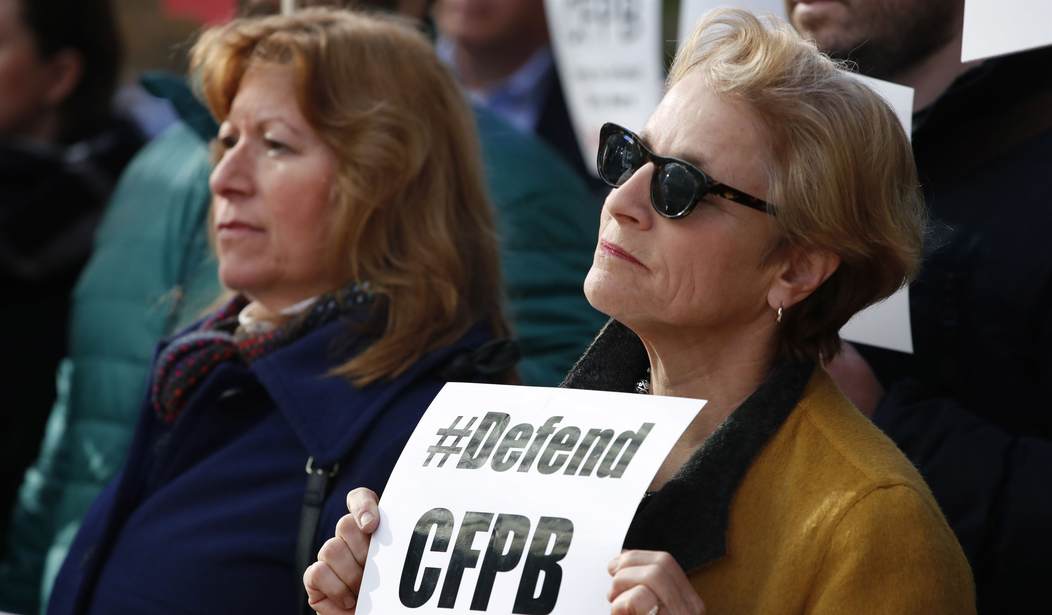The Consumer Financial Protection Bureau (CFPB) would be voted the "Most Useless Federal Agency" if such a vote ever took place. The agency "has spent much of its short life making things harder for the consumers it set out to protect," writes Veronique de Rugy in Reason.com.
If that's not enough reason, the CFPB does not receive any funding from Congress, and its director can only be fired "for cause." This puts the agency beyond congressional oversight. The one advantage is that the agency doesn't have the regular protections that other agencies have against what Elon Musk is trying to do to the CFPB today.
The fault lies with Sen. Elizabeth Warren and Barack Obama, who foolishly believed that insulating the CFPB from Republican cuts and efforts to get rid of it by funding the agency through the Fed would protect it.
The White House submitted a budget to the Federal Reserve for the CFPB this week. It was for zero dollars.
Unfortunately, an Obama-appointed federal judge has put a temporary hold on Elon Musk's efforts to make the agency disappear.
U.S. District Judge Amy Berman Jackson blocked the CFPB from terminating additional employees after the Trump administration this week fired dozens of agency workers, including an entire team of people scrutinizing Big Tech companies’ financial products. The order blocks the CFPB from terminating any employee, other than for performance-related reasons or misconduct, or starting the process to lay off career agency employees.
In addition, Berman, an appointee of President Barack Obama, prohibited the Trump administration from destroying or removing any of the CFPB’s vast troves of data, which includes consumer complaints and sensitive information collected about how banks and other financial firms are complying with federal laws.
Berman has set another hearing for March 3.
The fatal flaw in Obama and Warren's plan to insulate the CFPB from the law was its funding mechanism. Asking the Federal Reserve for zero dollars to fund the agency essentially kills it.
CFPB Director Russell Vought, also the director of the Office of Management and Budget (OMB), posted an explanation to X that he should get framed.
"Pursuant to the Consumer Financial Protection Act, I have notified the Federal Reserve that CFPB will not be taking its next draw of unappropriated funding because it is not 'reasonably necessary' to carry out its duties," Vought wrote on X on Saturday night. "The Bureau's current balance of $711.6 million is in fact excessive in the current fiscal environment. This spigot, long contributing to CFPB's unaccountability, is now being turned off."
De Rugy points out that the mission of the CFPB duplicates the efforts of several agencies already in existence.
The Federal Reserve has a security function. Then there is the Federal Deposit Insurance Corporation, which supervises financial institutions to prevent reckless banking practices. The Commodity Futures Trading Commission oversees the futures, options, and swaps markets; it's supposed to make sure that trading in commodities like oil, wheat, gold, and financial derivatives isn't rigged by bad actors or overly destabilized by excessive speculation. The Federal Housing Administration enforces fair lending practices in the mortgage market, while agencies like the Federal Trade Commission and the Office of the Comptroller of the Currency have historically handled deceptive financial practices. And so many more are also on the beat, including common-law actions against fraud.
Yet the CFPB was created under the premise that these agencies and the law were somehow asleep at the wheel as evidenced by the financial crisis, and only a new, unaccountable bureaucracy could finally rescue consumers from their own financial decisions. The reality is that no new protection was created for consumers by the CFPB. Creating the CFPB was merely replication, duplication, centralization, and the employment of thousands of people. What we got was simply more officious harassment of financial actors, all of which raised costs to consumers.
When the CFPB was created in 2010, the banking sector was recovering from the subprime mortgage crisis. Could those regulatory agencies that de Rugy mentioned have done a better job of performing oversight of the "too big to fail" banks? Hindsight says "yes." But it should be pointed out that Democrats cheered the ability of mortgage outlets to give credit to people who never owned a home before by creating novel mortgages, including so-called NINJA loans (no income, no job, and no assets" loans with no down payment required.)
The promise was that these consumers could refinance later after their investment created equity. When the bottom fell out of the housing market, the crisis almost sent America into a depression.
The CFPB was an extraneous agency with little utility except to add regulations and look for wrongdoing where none existed. It may take a while, but the Consumer Finance Protection Bureau will soon be ancient history.










